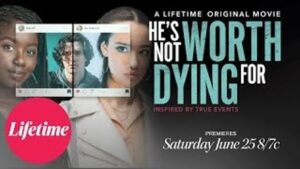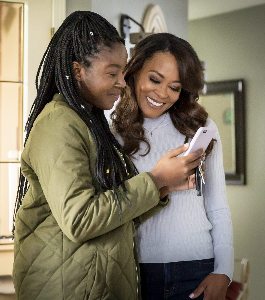TV Interview!
![]()
Interview with the cast and executive producer of “Tracker” on CBS by Suzanne 1/31/24
This was a CBS Winter press panel for two new shows, “Tracker” and “Elsbeth.” (The latter part is here.) Unfortunately, I didn’t get to ask a question, but it was fun to see all of them on camera and hear them talk about the new show. I hope it’s a big success! Don’t miss the premiere, right after the Super Bowl, 2/11. It’s an entertaining action/adventure show.
This is the second time I’ve been on a virtual panel with Justin Hartley, who stars as Colter Shaw. Colter tracks down missing people for the reward. He travels around in an Airstream and, of course, has a team of people helping him. It’s not that straight-forward, though, as we learn he’s had a troubled childhood. The last panel I was on with Hartley was for This Is Us a few years ago. I didn’t get to ask him a question then, either. I hope someday that I can speak with him! I’ve been a fan of his since he played Fox on “Passions,” and I also loved him in “Smallville” and “The Young and The Restless.”
Tracey Raab: Hi, everyone. I’m Tracy Raab with the CBS Network Communications team. Thank you for joining us today as we welcome the cast and producers from our new drama series Tracker, which premieres after the Super Bowl, and Elsbeth, which premieres. Thursday, February . Thank you again for your support, and I will turn it over to Sienna Sanders to begin our Tracker session. Thank you.
Sienna Sanders: I’m Sienna Sanders from CBS publicity, and along with my colleagues, Erin Frailick, Chris Caspers and Susie Adurien, I would like to welcome you all to our winter press conference for a new series, Tracker to premiere on Sunday, February Eleventh, after the Super Bowl. Based on the best-selling Jeffrey Deaver novel, “The Never Game, Tracker follows Colter Shaw, a lone wolf survivalist, who roams the country as a reward seeker. joining us from the set of Tracker in Vancouver, we have star and executive producer, Justin Hartley; and cast members Fiona Renee; Robin Weigart, Abby McEnany, Eric Graise; and executive producer and director, Ken Olin.
Before we begin our Q&A, we would like to invite Justin to share a few opening remarks with all of you. Justin?
Justin Hartley: Hey, y’all. Well, thank you for joining us, and for those of you who watched the show, or several of the shows that were provided. Thank you very much for that. I know everyone’s so busy. You know, Ken and I worked together, as you know, on This Is Us, and we had this really great culture and great experience together, and developed such a tight friendship, sort of like a family, that we sort of looked at each other, and we said, “We gotta do– we gotta keep doing this. We wanna do another show. And so we were on the lookout for something really great to do together, and we found this book, and we were able to luckily get our hands on it and develop it, and from there find this extraordinary cast to fill out our show. We’re so lucky. And we have, I think, continued that culture that we found on This Is Us in this really wonderful environment. So again, thank you and open up to whatever questions you might have. Keep them appropriate if you can, you don’t have to. And simple.
Jim Halterman: Hey, guys, I’ll keep this appropriate. Ken, can you tell first just what you saw in the book? Because Justin told me you’re the one that gave him the book. What was it in the book that you saw as a series, and for Justin to kind of take on?
Ken Olin: I had been, I think, both Justin and I, after 6 years of babies and dogs, we wanted to do something that would be fun for us to do. Probably we were looking for something that was a little more story-driven… plot-driven. Justin, you know, wanted to carry a gun and get in fights. So I always– was in the mood to try to find something that maybe harkens back to the old PI shows that I grew up with, which was before most of these people were born, I think. But you know, shows like The Rockford files and Mannix and things like that. But I didn’t want to reboot a show. I wanted to find something that was based on a character who had a more contemporary psychological background. And then I read “The Never Game”. By Jeffrey Deaver, whose work I always have loved, and, I mean, the character is described…it’s like Justin. It’s a character who, I mean, this is a stretch, but looks like a movie star and is tall, and is underestimated– is always underestimated. And I’ve always felt Justin is– I love working with him. I think he’s incredibly talented, and I think he’s… often he surprises people with all of his skills. I took it to Justin. I said, “Hey, man, I think this would be fun to do. I think we can do a real contemporary version of a PI show, and let’s do it together.” And Justin read it, said, “Good, I’m in. Let’s do it.” And then, yeah, Twentieth [Century Fox] I mean, I think they like the idea of us working together and doing this kind of show. So that was how it came about.
Jim Halterman: Alright, alright, thanks, guys.
Sienna Sanders: We’ll take our next question from Mark Berman.
Marc Berman: I thank you for doing this. My question is, for Justin or Ken, or anybody that wants to answer, actually… you know you. Of course, you mentioned you come off of 6 amazing years on This Is Us. Can you go back to the days of Thirty Something, so a lot of the work that you’ve done has evolved a story, a family element story. Can you talk to me about that? What’s the back story on this show with us? Supposedly this fractured family? What is this family? And why is it fractured?
Ken Olin: So let’s see….I’m exhausted.
Justin Hartley: So, Ken’s done. Yeah, I think I have one more in me. That’s a really good question, actually, and it’s sort of a driver for all of the stuff that you see this character do in his adult life. There’s an element, I think, to most, if not all, of the jobs that he takes… that, and his ability to solve– to find these people, and to get these positive outcomes that comes from the way that he was raised, and the way that he was raised is not necessarily always easy on the palate, I mean. His father was very, very difficult. He had a rough childhood, really unique– strange kind of childhood. But all of those things that he went through when he was younger are things that he was taught, and that he uses in his current life. And you know, I think a lot of the stories that we tell open up and (correct me if I’m wrong), but I feel like they open up Colter a little bit, in the sense that he then kind of can reflect on his childhood. And oftentimes I think the way that you remember things might not be actually the way they actually happened, right? And I think Colter’s kind of figuring that out as well. So, but that’s a major part of our show is the backstory in the family, and he’s got a lot of questions about his, about his childhood and what he ends up, I guess, realizing our assumptions. That might not be true.
Ken Olin: With all of these shows there is some kind of a family created, in most of the procedurals. It’s called a team, and one of the things I found really appealing about this story was: he’s created a family. It’s just that. It’s a family that is, in some ways, I think, representative of a contemporary way of life. Now, where we communicate with our family on Zoom, on phone text, he has a family. It’s just that they’re not all in the same room, I mean, and they can’t all fit in the Airstream. So… but it’s still, I mean, he grew up, you know, he grew up with a very fractured family. There are secrets, mistrust… So you have a character at the center of the show. Who is he? He mistrusts intimacy. He mistrusts those bonds. And yet, at the same time, he’s created those bonds with all of these people that you see here, but they’re kept – in some ways – at a distance, and yet they all interact, and they interact the way a family does… but not in the way that we’re used to seeing, I think.
Sienna Sanders: Great. We’ll take our next question from Bruce Miller.
Bruce Miller: This is for Justin. How difficult is this workload? I’m assuming that on This Is Us you, like…
Ken Olin: Nothing, are you kidding? And This Is Us. It was like, “Justin, Wake up. Come on, please come to work. Please come to work”, you know. Now, it’s like every day in the rain, the kid is…he’s 26 years old. Look at him.
Justin Hartley: I just remind you that the question was for me. Sorry I’m not warming up. The workload is great. Look, here’s the thing. I love it. I’ve always wanted this, and it’s not work. It’s a labor of love. I mean, you have a call time, and you show up. And gosh! People have written stuff for you, and people are lighting you. And I’ve got this amazing support group around me. These guys, I mean… it’s a team effort, for sure. And whether you’re on stage, or out in the middle of the forest in the middle of the night on a Saturday morning. Yeah, in 4 degrees by yourself, or whether it’s you, or whether it’s you guys on stage, or wherever you are. It’s the story that that matters. And when you watch the finished product, it all becomes worth it? So I don’t. I don’t really feel the workload. That’s …I mean, that’s bullshit. I do. It’s hard, it’s really hard. No, it’s not… Look, I mean, I’m not in the renegotiation. I’m not complaining. It’s been great when you get an opportunity to do something that you love and spend a lot of time doing it with people that you love. It’s a joy.
Sienna Sanders: Great. We’ll take our next question from Luaine Lee.
Luaine Lee: Justin, I like that fact that Ken said your character is underestimated, and I think actors are always underestimated at some point. Can you think of a point in your life when you are underestimated?
Justin Hartley: Yeah, I– sort of… gosh! Can I think of a point when I wasn’t? I like being underestimated. I think I think it’s a good place to be. In a place where people expect perfection, and then you don’t deliver, is a worse place to be than if you’re underestimated. I don’t mind being underestimated. It’s fine. I mean, I don’t know. Do you mind being underestimated? I never mind that. I like low expectations, I guess, is what I know. Yeah, I think that it’s OK. I thrive on that. I don’t mind that at all. I get it, too. It’s all good. It’s all good.
Luaine Lee: Thank you.
Sienna Sanders: Okay, we’ll take our next question from Jamie Steinberg. Jamie?
Jamie Steinberg: Yes, and Justin, how much did the author influence the character you created? Were you close to what he created? Did he talk to you a little bit about fleshing out your version of this individual?
Justin Hartley: Yeah, I would say quite a bit… good question. I would say quite a bit. Ken and I talk about it all the time. It’s actually– you could probably answer that better than me. We worked on this character together, you know? Obviously Jeffrey wrote it, and then you have to figure out a way… What is it that’s so interesting about this character? First of all, what drew you to it? And then from there. How do you adapt it to the screen? Because it doesn’t– There are certain things in the book where this character, he does a lot of calculations and sort of talking to himself in his head. You just can’t do that on screen. It would be very hard to watch. You’d be reading a lot, and it would be very hard to watch. So you have to figure out a way to show this guy and what’s going on in his head without just having him talking to himself all the time, which, sort of, is not the character. He’s not a weirdo. He’s not constantly talking to himself like Ken, and he’s not haunted. But yeah, we talked a lot about that. Actually, how do you get all of that stuff that we love about the character in the book translated to the screen without losing it, but also without kind of making it look like something it’s not? I think his skill set is very much his skill set: his physicality, his relationship to women. Those things are very similar to the book.
Ken Olin: I think probably the biggest adjustment that we made was to try to use Justin’s sense of humor and his ability. Justin’s. He’s so good with humor. The character in the book isn’t. He just isn’t the same that way. He’s a much more silent kind of character. So we wanted to use Justin’s facility. And also, I think it translates well, in television. It’s something that’s really appealing, and it’s very appealing about Justin. So that would be, I think, the biggest difference between the character in the book and the character on the show.
Sienna Sanders: It’s great. We’ll take our next question from Mike Hughes.
Mike Hughes: Uh, Justin, when they talk about this character being not as silent as the book? He’s still really silent. He doesn’t talk very much. A strong and silent kind of guy. What’s it like to play that kind of thing after you played [the opposite] for 6 years? Where there was a lot of talk about everything.
Justin Hartley: That’s a great question. Well, in some sense it’s a relief, nd in some sense it’s a daunting task. You know, when you’re still, and you’re on camera, and you’re still,and you’re not talking, you’re telling the story through your– well, your look, and what’s going on with your body? You’re not. It’s an interesting thing. It’s a bit scary, in a way, because you’re sitting there going. Ok? I’ve been still in silent for a good solid 40 seconds. Is that boring? Is that going to be interesting, I mean, is that going to, you know, make people think that I’m asleep, or something, or..? But it’s really not. I mean, the writing is good, and the storytelling is great, and if Colter’s listening to something… and I firmly believe that, as far as acting goes…if you actually do what you say you’re doing, sounds like, you know, actually firing a gun or actually stabbing someone or actually punching someone. If you’re emotionally doing what you say that you’re doing, I think that’s very hard to deny or to say that that’s not true or honest. So I love it. I think it’s really cool, too. I love those characters, too. I love watching a character not necessarily talk all the time, but think. As an audience member just sitting here, watching what Bruce Willis might be thinking, and then you sit at the edge of your seat wondering what he’s going to say next. So I’ve always been a fan of those kind of characters. So for me it’s sort of a dream come true. And now we’ll stop talking.
Fiona Rene: And we’ll watch you.
Whitney Friedlander: Hi, there! Thanks everyone for doing this. Not to bring it up. This Is Us: comparisons are too much. But there was a pivotal episode of This Is Us that aired after a super bowl. And you guys are premiering after a super bowl. Is there any extra pressure – both because of those things to see how it goes? And also, I wanted to talk to Ken also about the decision to change the name. You said you didn’t want to do a reboot or anything like that. But also, you’re working with an IP that has a known property. And why you went from calling it “The Never Game” to calling it Tracker.
Ken Olin: Because I can’t remember. Yeah, the Super Bowl part. Yeah. Well, listen. One of the great things for us was when Amy Rice, in fact. from CBS, gave us this time slot early on, with an impending strike and everything else. It was an incredible vote of confidence. Because, you know, there was a much better chance that we were going to have an incredible launch than there was that there was going to be a false schedule to begin with. So that was a huge thing. And yeah, there was pressure. A lot of the pressure became simply practical in that we had to create scripts, generate scripts, and be able to produce a certain number of shows, so we could stay on the air after the Super Bowl, you know, in the weeks coming up, because there was no point in launching a show after the Super Bowl, and then having nothing. So there’s that pressure. It’s better to have this pressure than not have this pressure. You know, it’s an incredible opportunity, and there’s a tremendous amount of support. So that’s been great.
As far as changing the name goes…the biggest issue was that there’s IP.. with no game involved. Where there are no games, and I think what we didn’t want was to have people watch the show and see this guy rescuing somebody in the desert and wonder when the game would start. What’s the game — fix the bone or whatever it was. I think that was a big– that was the basis of the decision It was, look, there is no game involved it. It has to do with, also one of the books and one of the stories. It’s not actually pertinent to what he does or anything else. It was just the title of one of the books about Colter Shaw. And so the title… we did some research on the titles, and this title really stuck with people. So it was a practical decision, and I think a really smart one. Also. I don’t know how many games you wanted to play: Monopoly, not thrilling. That was why we changed the title.
Sienna Sanders: Question to Abby and Robin: How would you describe Teddy and Velma’s relationship to Colter, and with each other?
Abby McEnany: Oh, sure! I think our relationship– my relationship with Velma and Teddy is based on comfort and love and respect, and they’re very different. But they work off each other their differences. They work off each other, and I think it’s quite lovely. It’s very lived-in to me. It’s very intimate in how small it can be, if that makes sense. And then our relationship with Colter, I think, originally, was like that. Velma was very motherly, and I think it’s come off that more. I’m always excited for Colter to find out like who you’re sleeping with, and like, are you always? Did you not get that? Okay? Maybe that’s something to talk about later. And I just think– I’m always very worried– Abby herself is very worried for him. Long answer. Sorry, everybody. Anyways, I think he’s really lovely. I think that we consider– in my brain, it’s like, Colter is chosen family. And like, yeah, close, and we look out for him. And I think that he is [family], yeah. And we depend on each other. That’s my takeaway.
Robin Weigert: Yeah, the only thing I would add to that is, I may have, sort of, more the practical head in this duo, and I’m always looking for the job that will give us the most money for the least risk for our boy, you know, and it’s always– it’s never going to be as simple as I think it is, either because if it’s too simple of a job, so he’s not going to remain as excited by it. He’s just not going to be as excited by it. If I’m sending him to look for a car, it’s a safe, easy job, great reward. He may very well find a want ad and be uninterested in that car, and so I have to keep slicing it that way. And I’m also I have an eye to her, because if he gets into a lot of danger, then it wreaks havoc on our relationship because she gets concerned and is tempted to want to go and help him. And you know, I’m trying to keep our home intact, as well. So I kind of have a bit of that relationship to the whole thing. We both love him a lot, and I’m just trying to keep this train on the tracks.
Abby McEnany: I’m not allowed to leave the house… we’re not playing. He’s gonna try to leap into, I don’t know… a burning building to keep our home intact. So, yeah. We have a little bit of a different approach. But we have the same goal, and we both don’t tell him. But we both love this guy a lot.
Sienna Sanders: Okay, we’ll pick our next question from Rob Owen.
Rob Owen: For the producers: Will we ever get to see Colter in the same room as Velma and Teddy? And will we learn how they know each other, how they came to know each other? And last, what happened to Mary McDonnell, and what’s the name of the actress who now plays Colter’s mom?
Ken Olin: Yes. yes, to those questions. Listen. The actress who now plays Colter’s mother is Wendy Crewson. She’s fantastic. There were, basically– there were certain practical aspects to the character, and what we wanted to do going forward, and how much we would integrate that character into the storylines versus what we had originally thought when we did the pilot. And so the decision, which was mutual, was just…. This is a better situation, economically. It’s a better situation for all of us. Look, the character, and the way we’re going to use her, is changing. And so, therefore, it just made sense to change actors.
Rob Owen: Thank you.
Sienna Sanders: Alright. Now, Eric, are you as tech savvy as Bobby is?
Eric Graise: Oh, yeah. So, I spend most of my life working on hacking, and taking apart computers and stuff. No, Bobby, he’s… yeah. He’s way smarter than I am, different skill set. Yeah, but I identify with him more, on, you know, it’s kind of street level. I like his humor. He’s definitely into a sense of fashion. That’s kind of my favorite thing about Bobby. But yeah, no, I’m not the guy you call for computer stuff. I’m more of a Dungeons and Dragons kinda nerd.
Ken Olin: I just have to tell you… The character that we originally created was about 55 years old… military guy. This kid came in and did an audition that was so brilliant. We changed everything. And, by the way, we didn’t have anywhere near as clear an idea of who this character was until, you know, Eric came along. I just love working with him. He’s awesome. I don’t like working with anybody else on the show. [Laughter]
Sienna Sanders: Our next question will be from Rick Bentley.
Rick Bentley: Thank you. Hey, Justin? I know you guys have talked about that you’ve changed things from the book. But at the end of the day, you still have that book as a source material. Do you like that idea, or do you prefer, when you’re creating a character, to create your own bible to create your own backstory?
Justin Hartley: Good question. I like both. I think there are fun aspects of both. It’s great to have that source material, though, because week-to-week, as we get these new episodes, new story, new guest stars, new set of circumstances, new job… whatever it might be. You do have that source material. So if you have an acting technique, in a way, I find that you barely ever use it. But the fact that it’s there gives you comfort, right? So, as the stories change week to week, and like, I said, new characters come on in new… I don’t want to call them cases, but new jobs, new set of circumstances. You have that source material. You always have that, sort of, in the back of your head, “What would Colter do?” And you use that source material. At least I do… to decide for yourself, “What would Colter do?” Well, how would he react in this situation, given the source material. So I use it. And I find it’s good to have.
Sienna Sanders: Hey, Fiona, you have now played a lawyer on CBS shows back to back. How does Reenie Green compare to Rebecca Lee?
Ken Olin: Reenie’s alive?
Fiona Rene: What he said? You know, I think they’re completely different. They’re both lawyers, and they both are a little hard-headed and smart. But Reenie has a lot more fire. She’s got a lot more fire in her, for sure… she’s sassy. She doesn’t take any of his bull. I think she likes to fight, and she doesn’t like to run away. And Rebecca was very much, run away from her problems. Girl, until the end. That answer your question?
Sienna Sanders: Yes, thank you, and we’ll take our last question from Megan Behnke.
Megan Behnke: Hi! My question is for Justin. How would you describe Colter’s personality, and his persistence to be a rewardist, since it’s such an odd career choice?
Justin Hartley: Yeah. I mean. I think he’s, you know…. what I love about him, I think he’s a good man. He’s a good man, and he wants to do good things for people in need. And I think we talk a lot about how he’s a restless guy. He can go in, you know, sort of help a situation. There’s an outcome, and then he leaves. He has a hard time, like you were saying, running away. He has a hard time not running away. I don’t think he intentionally runs away. I just think it’s how he is. He’s afraid of a lot of stuff, oddly enough. And I think that’s why he finds he’s trying to fill this void that is probably unfillable. But he’s trying to fill it with. You know, these rewards and helping strangers. And, like Ken mentioned, he’s sort of created this family around him to try to fill all these voids that, like I said, I don’t think he can fill, and I also think, at a surface level, I think he enjoys the action and the fun and the excitement, and not being tied down, and the freedom. But yeah, I think it’s definitely, when you look at his past, his childhood, the way he was brought up, what happened to his father, the questions that he has about his family, and the paranoia that he was surrounded by when he was younger. And then you look at what he does as an adult, it all makes sense, and you go, well, that he’s a product of his environment. What? What? You know, what happened to him as a youth. I hope I got that right, ’cause.e’ve already shot like episodes. [Laughter]
Justin’s Closing Remarks
Justin Hartley: Yeah, well, look, I mean, I’m really, really proud of the show that we put together. It’s a team effort. The culture that I found on This Is Us with that group – with Dan Fogelman, and with Ken, and the whole cast – that we had these lifelong friendships that’ve developed with Chrissy, and Sterling, and Mandy and Milo and everybody. I’m really proud of what we’ve done here, because that was a special time in my life, and I thought, “Man, I’m going to savor every flavor because you never get that back.” And I feel like, somehow, I was able to get a second shot at it, and I’m so happy to be with all of you, and thank you for watching our show. I think we have something really special. We pour our hearts out or into it, and blood, sweat and tears. And I know everyone’s so busy. So thank you for watching, you will be entertained. And yeah, we do have guns and fighting, so it’s a fun one.
Sienna Sanders: Thank you so much.
MORE INFO: Trailer Official Site

TRACKER stars Justin Hartley as Colter Shaw, a lone-wolf survivalist who roams the country as a reward seeker, using his expert tracking skills to help private citizens and law enforcement solve all manner of mysteries while contending with his own fractured family. The series is based on the bestselling novel The Never Game by Jeffery Deaver.
|
|
Series premiere Sunday, Feb. 11 following SUPER BOWL LVIII on the CBS Television Network and streaming on Paramount+ (live and on demand for Paramount+ with SHOWTIME subscribers, or on demand for Paramount+ Essential subscribers the day after the episode airs). |
|
ON AIR: ORIGINATION: |
Sundays (9:00-10:00 PM, ET/PT) Vancouver |
|
FORMAT: |
Drama (Filmed in HD) |
|
STARRING: |
Justin Hartley |
(Colter Shaw) |
|
|
Fiona Rene | (Reenie) |
|
|
Robin Weigert | (Teddi) |
|
|
Abby McEnany | (Velma) |
|
|
Eric Graise | (Bobby) |
|
PRODUCED BY: |
20th Television |
|
EXECUTIVE PRODUCERS: |
Justin Hartley, Ken Olin, Elwood Reid and Ben Winters |
|
PRODUCERS: |
Jeffrey Deaver |
Proofread and Edited by Brenda
Back to the Primetime Articles and Interviews Page
![]()
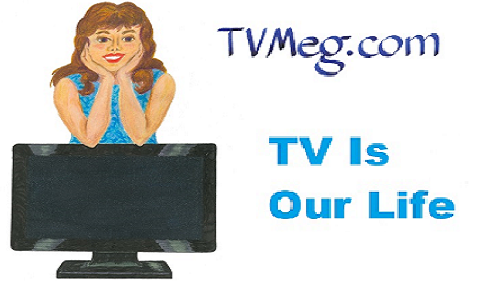


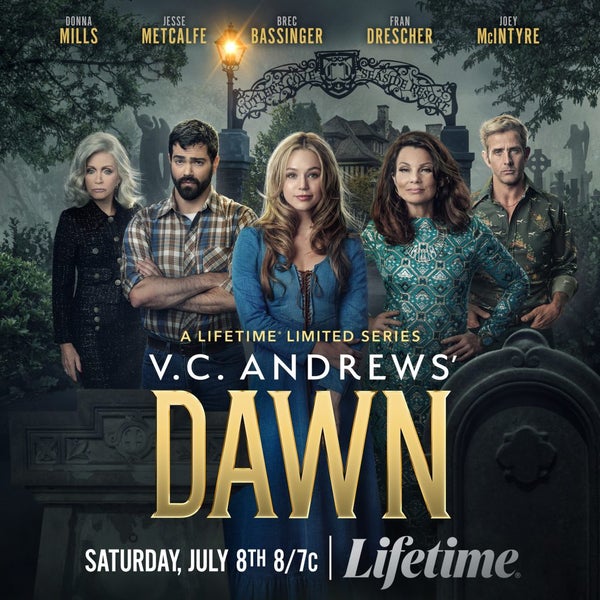
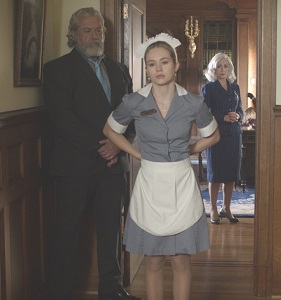
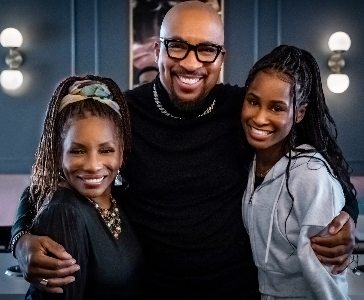
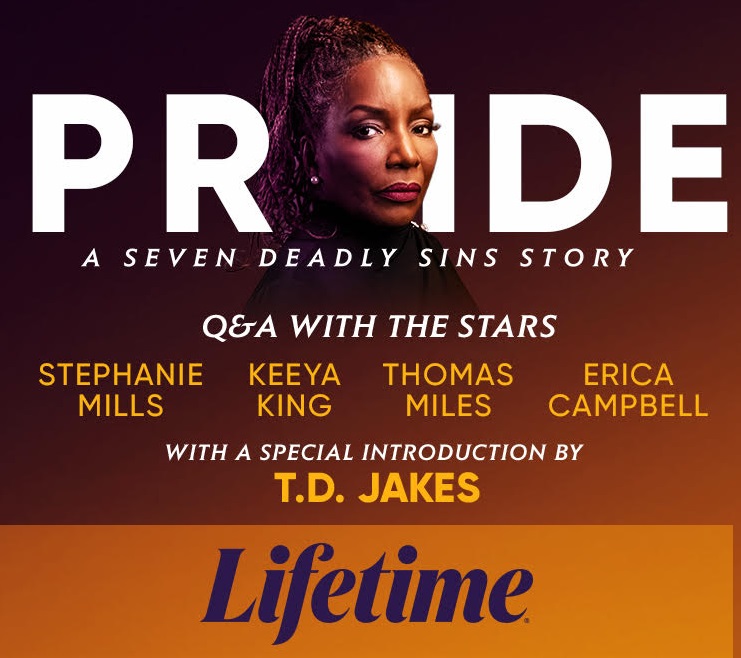 Lifetime Announces “Pride: A Seven Deadly Sins Story” – The Next Movie Title in its “7 Deadly Sins” Movie Anthology
Lifetime Announces “Pride: A Seven Deadly Sins Story” – The Next Movie Title in its “7 Deadly Sins” Movie Anthology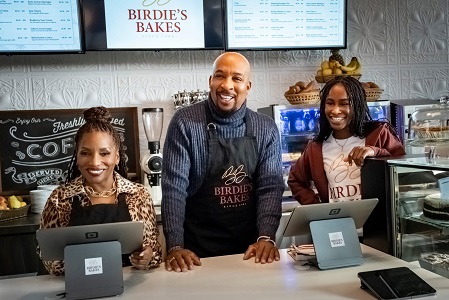
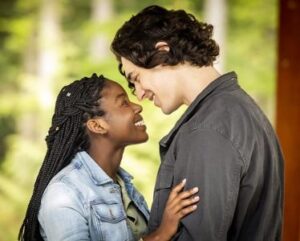
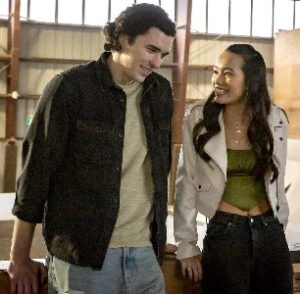
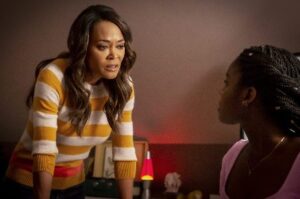 MODERATOR: Thank you. We also have some pre-submitted questions from journalists who could not be here today. This question is for Hilda. Hilda, you have some pretty intense scenes with Robin Givens who plays your mother in the movie. What was it like working with a veteran actress, and did she give you any advice or were there any fun times together on the set?
MODERATOR: Thank you. We also have some pre-submitted questions from journalists who could not be here today. This question is for Hilda. Hilda, you have some pretty intense scenes with Robin Givens who plays your mother in the movie. What was it like working with a veteran actress, and did she give you any advice or were there any fun times together on the set?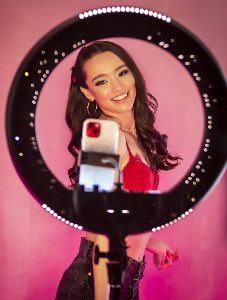 RACHEL BOYD: Thank you.
RACHEL BOYD: Thank you.